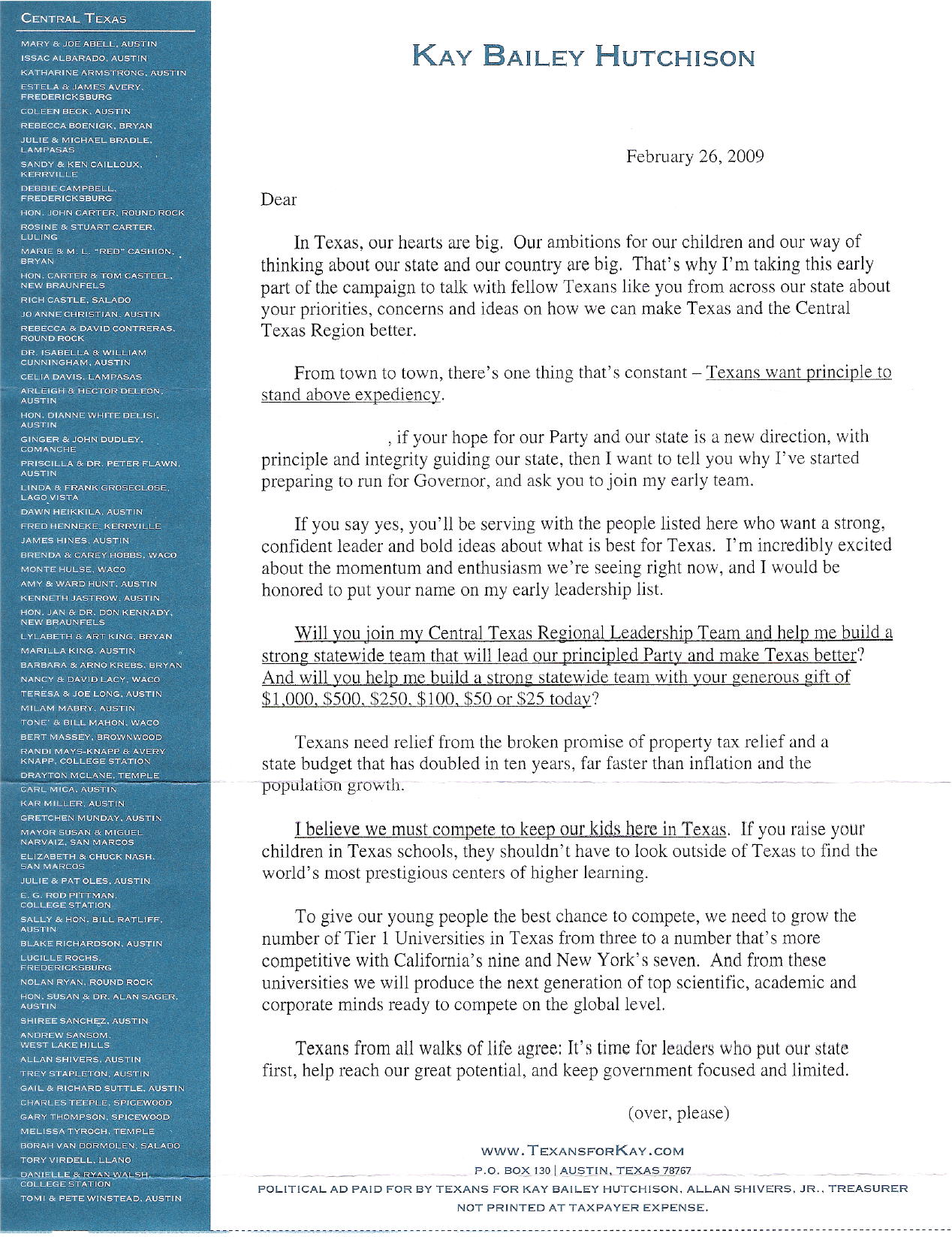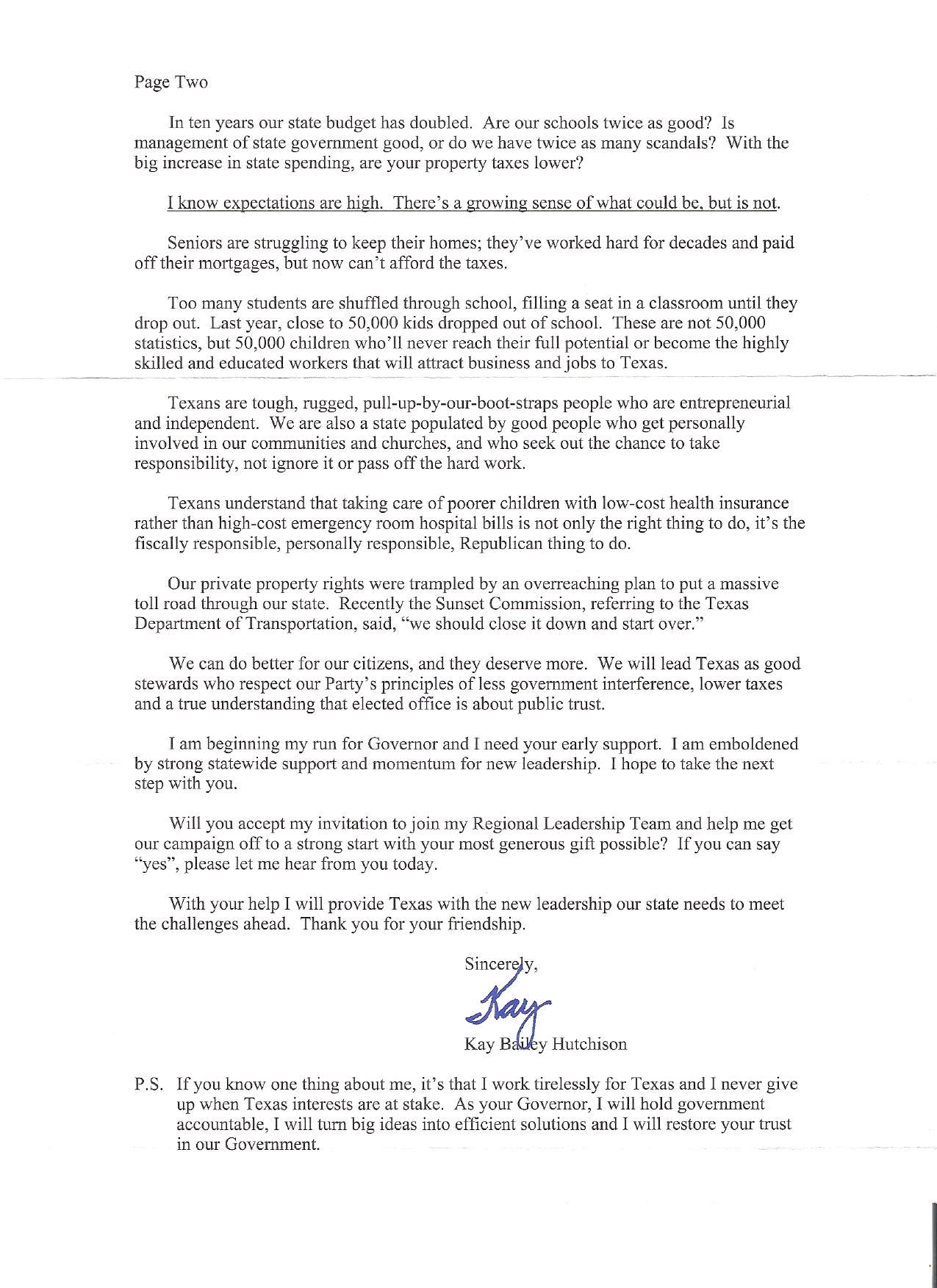An East Texas Republican is the butt of the blogosphere after inviting an attorney to buss his rear end. Also making news on the blogs this week: federal government spending, constituents with special interests and percolating legislation. Wrapping things up are posts of a different order.
* * * * *
You Can't Go Home Again
After a heated discussion over his immigration-oriented legislation, Rep. Leo Berman, R-Tyler, told attorney Harry Joe (who happens to be of Chinese descent) to "go home" and "kiss my ass." (Joe wasn't an innocent party — he called Berman "despicable" and "an evil man.") Joe later apologized; Berman didn't, the Dallas Morning News's Trail Blazers says.
In response, progressive bloggers joined forces against Berman to form a movement they call CensureLeo.com, Capitol Annex reports. In an interview with the Houston FOX TV affiliate, Bay Area Houston calls Berman "anti-Mexican," but Berman says he's just anti-Dallas-immigration-lawyers.
"On examining the balance of Leo Berman's actions in the legislature, his public statements, and the testimony of those present, I can only conclude that his comments were most likely racist in nature," says WhosPlayin? Meanwhile, The Texas Cloverleaf says Berman "is old school. And by old school, we mean a racist." But Berman is taking the opposition in stride, calling it "a badge of honor" to be criticized by liberal bloggers, says Annex.
In all fairness, Berman knows at least one word of Spanish, reports Vaqueros & Wonkeros, the El Paso Times's blog. And Blue Dot Blues says Berman is "THE guy" (in a well-intentioned way), promoting a Berman support group on Facebook.com.
* * * * *
Federal Pork, Texas Tea
Conservatives held a nationwide Chicago Tea Party on Friday to protest escalating federal government spending. Blue Dot Bluesposts a list of the Texas get-togethers, followed by photos and reports from people who attended. PoliTex, the Fort Worth Star-Telegram's blog, has pictures of protest signs in Fort Worth and links to more info on other places. Meanwhile, Pondering Penguin has some background on the origin of the event.
Saying there's so much money to spend, and so little time, federal stimulus chair Rep. Jim Dunnam, D-Waco, tells reporters that the budget might be held up by the influx of federal funds, but he's not anticipating a special session, yet, according to Postcards, the Austin American-Statesman's blog.
Here is a link to a clearinghouse for posts on the federal budget by Texas on the Potomac, the Houston Chronicle's blog, who also takes a look at Houston-area earmarkers and has an extended story on Texans' pork-barrel spending.
* * * * *
Visitors' Passes
KVUE's Political Junkie took pictures of a rally by college students demanding tuition relief. Rep. Ryan Guillen, D-Rio Grande City, was there and posts a photo of himself on his El Wiri Wiri Blog. Fellow legislator/blogger Rep. Aaron Peña, D-Edinburg, also was there, and posts photos on his A Capitol Blog.
Rep. Joe Deshotel, D-Beaumont, snaps shots of animals brought by the Texas State Aquarium to the Capitol, including a python, alligator, turtle, terrapin and boa, then uploads them to his Pollabear blog. The Texas Cloverleaf attended the first biennial Texas Stonewall Democratic Caucus in Austin. A lot of political-types showed, including U.S. Senate hopeful Bill White.
Postcards was on the scene for a Capitol demonstration by folks demanding massive changes to Texas state schools. And TFN Insider is calling on readers to attend its Legislative Lobby Day on March 10, starting off with a training session for lobby teams.
* * * * *
Billy Club
House Bill 1653 by Rep. Marc Veasey, D-Fort Worth, creates a voluntary "Licensed Builders" certification that Bay Area Houston says is similar to the Texas Star Builders program that already exists (but ideally homebuilders would actually participate in Veasey's new program). The same blog also looks at HB 1635 by Rep. Todd Smith, R-Euless, that would outright abolish the Texas Residential Construction Commission.
HB 1986 by Rep.
Trey Martinez Fischer, D-San Antonio, "would
amend the protective order law to include safeguards for third parties," says
Texas Politics, the
Houston Chronicle's blog.
Texas Politics also writes about Senate Bill 1164 by Sen.
Jeff Wentworth, R-San Antonio, allowing concealed handgun license holders to
pack heat on college campuses.
The Statesman's Public Capital blog analyzes a bill by Rep. Lois Kolkhorst, R-Brenham, that would give the Texas AG say-so over the hiring of all outside legal advisers to the Teacher Retirement System. Meanwhile, Annex looks at legislation dealing with veterinarians' loans, 17-year-old voters, prison condom distribution, bodily fluids and young legislative advisors.
The
Austin Chronicle's
Newsdesk goes over a
journalist shield law,
needle-exchange program and
drug cartel bust-up attempt.
A Keyboard and a .45 is tracking a pair of house resolutions
affirming individual states' rights. (Since those kinds of things tend go over well.)
Composite Heap
Burnt Orange Report has established a physical headquarters in "the coolest place to office in Austin," according to the building's website. More importantly, "We've formalized paperwork to turn BOR into a business entity," say the bloggers.
BurkaBlog has a two-parter on the "dire" state of the Unemployment Compensation Trust Fund, here and here. Meanwhile, Junkie has a new feature called "Impact Players" where she'll interview behind-the-scenes movers-and-shakers at the Capitol. First up is lobbyist Jay Propes, who claims journos are more feared than lobsters. And Tex Parte Blog spotted former Texas lawyer Sarah Davis critiquing designer handbags on the red carpet at the Oscars.
Brazosport News gives a heads up that Hearst newspapers (including the Chron and the SAEN) are going to institute pay-to-read policies for some online news content. Poli-Tex brought his camera along with him on a tour of a San Antonio Water System facility, including a taste-test of treated sewer water. And former Dallas Mayor Ron Kirk will be vetted publicly as Obama's next U.S. Trade Representative on March 5, according to Tex Parte.
Potomac has reactions to Obama's big speech Wednesday night from blog contributor Helen Thomas and from the Texas delegation here, here, here, here, here, here, here, here, here, here, here, and here. Capitol Blog took photos during his walk to work through downtown Austin. And Brazosport News reminds readers that some things and people remain constant, even in the turbulent times.
Texas Observer Blog is all over an announcement by Perry in support of building 16 water reservoirs (total cost $260 million), potentially renewing a contentious eminent domain/property rights debate from last session. Via Eye on Williamson, a new blog dedicated to the Republican U.S. Rep. from Round Rock, called John Carter Watch.
George W. Bush supped with U.S. Sen. Kay Bailey Hutchison in Dallas Friday night, reports Trail Blazers. The Oval Office alumnus has pledged to stay out of the GOP race to occupy the Governor's Mansion (or some really expensive rent home near Austin). In other news, Rep. Sylvester Turner, D-Houston, says he will contend for U.S. Rep. Sheila Jackson-Lee's Congressional seat if and when she leaves for Washington, D.C., according to ABC13's Political Blog.
This edition of Out There was compiled and written by Patrick Brendel, who hails from Victoria but is semi-settled in Austin. We cherry-pick the state's political blogs each week, looking for news, info, gossip, and new jokes. The opinions here belong (mostly) to the bloggers, and we're including their links so you can hunt them down if you wish. Our blogroll — the list of Texas blogs we watch — is on our links page, and if you know of a Texas political blog that ought to be on it, just shoot us a note. Please send comments, suggestions, gripes or retorts to Texas Weekly editor Ross Ramsey.



